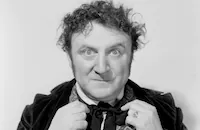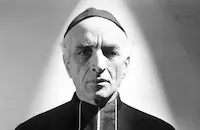Champagne Waltz
Cast & Crew
A. Edward Sutherland
Gladys Swarthout
Fred Macmurray
Jack Oakie
Veloz
Yolanda
Film Details
Technical Specs

Synopsis
In Vienna, Franz Strauss loses his business at the Vienna Waltz Palace to the new jazz club next door, which features Buzzy Bellew on trumpet. Elsa Strauss, a singer and Franz's granddaughter, goes to the American consulate to complain about the noise from Buzzy's music at the same time Buzzy is at the consulate to pick up some chewing gum. Aware that Elsa is against his music but nonetheless smitten by her, Buzzy impersonates the consul and a romance ensues. Meanwhile, the Countess sells a fake silver tea service to Happy Gallagher, the owner of the jazz club, and he falls in love with her. When Elsa accidentally swallows a piece of gum, she calls the consul to ask his advice and discovers that Buzzy has been lying to her about his identity. She sends back all the gum he gave her, but he finds her and apologizes, saying he is actually an icebox salesman. Elsa takes Buzzy to the waltz palace and they imagine it in its heyday, when "The Blue Danube Waltz" was first played for Emperor Franz Josef. Buzzy then pleads Elsa's case to Gallagher, but he refuses to help, so Buzzy quits. Elsa convinces Buzzy to take her to a show at the jazz club. When Max the manager announces his plans to tear down the wall between the jazz club and the waltz palace to expand the club, he attributes his success to Buzzy, thereby exposing Buzzy's real identity. Elsa then leaves the club. Buzzy returns to the United States and plays in substandard clubs, then calls Gallagher with an idea for setting up a waltz palace in New York City. In New York, Gallagher opens the Blue Danube Roof with Franz and Elsa as the main attractions. Buzzy goes to see Elsa and they fall in love again, and later open a combined waltz and jazz palace.

Director
A. Edward Sutherland
Cast
Gladys Swarthout

Fred Macmurray

Jack Oakie
Veloz
Yolanda

Herman Bing

Fritz Leiber

Vivienne Osborne
Frank Forest
Benny Baker

Ernest Cossart

James Burke

Maude Eburne
Maurice Cass
Guy Bates Post
The California Collegians
Michael Visaroff
Ferdinand Munier
Sam Savitsky
Emil Hoch
Henry Roquemore
Russ Powell
Ralph Fitzsimmons
Lillian Castle
Stanley Price
Rudolph Amendt
Nick Lukats
Alex Pollard
Henry Hanna
Tony Merlo
Raymond Brown
Mattie Edwards
Dorothy Vernon
George Lloyd
Harold Minjir
Martha Bamattre
Alex Woloshin
Lois Kent
Tommy Bond

Richard Carle
H. R. Brannum
Jerry Bergen
Tom Brower
Harold Nelson
Nora Cecil
Irene Bennett
Arthur Stuart Hull
Ralph Brooks
Harry B. Stafford
Lillian Dean
Bernard Suss
Tom Curran
Lucille House
Lucille Harding
Bunnie Waters
Jane Weir
Crew
Charles Althouse
Travis Banton
Phil Boutelje
Frank Butler
Frank Chapman
John Cope
Sam Coslow
William Daly
Hans Dreier
Ernst Fegté
Ralph Freed
A. E. Freudeman
Don Hartman
Frederick Hollander
Dev Jennings
Gordon Jennings
Gordon Jennings
H. S. Kraft
Burton Lane
William Lebaron
Russell Mathews
William C. Mellor
Harry Mills
Boris Morros
Le Roy Prinz
Leo Robin
Ann Ronell
Art Smith
Johann Strauss
Harlan Thompson
Paul Weatherwax
Billy Wilder
Adolph Zukor

Film Details
Technical Specs

Quotes
Trivia
Notes
The original story was entitled "Vienna Hall." According to a pre-release article in Los Angeles Times, Paramount had previously selected skater Sonja Henie and George Raft to perform the lead roles. Copyright records and press materials indicate the following: Choral group Maenner Gesanges Verain of the Turnverein Germania of Los Angeles, CA, perform in the film. The Most Beautiful Girls Orchestra, featuring Sylvia Rutherford, Virginia Gregg, Helen Ireland, Eunice Wannerman, Jo Harvey, Marjorie McAnolly and Kathleen McArtre, make their debut. News items in Daily Variety and Hollywood Reporter indicate that Champagne Waltz was recorded for release in five languages, and that Ann Ronell was the first female composer signed by Paramount. Fred MacMurray previously performed with the California Collegians in 1930. According to one modern source, independent producer Lester Cowan paid $10,000 for a screenplay written by H. S. Kraft and Billy Wilder, with the writers each receiving a $1000 advance. Another source notes that Wilder received $750 as a partial payment of a $1,000 fee, and when production was postponed, Cowan offered Wilder a writing position at Paramount as compensation.












